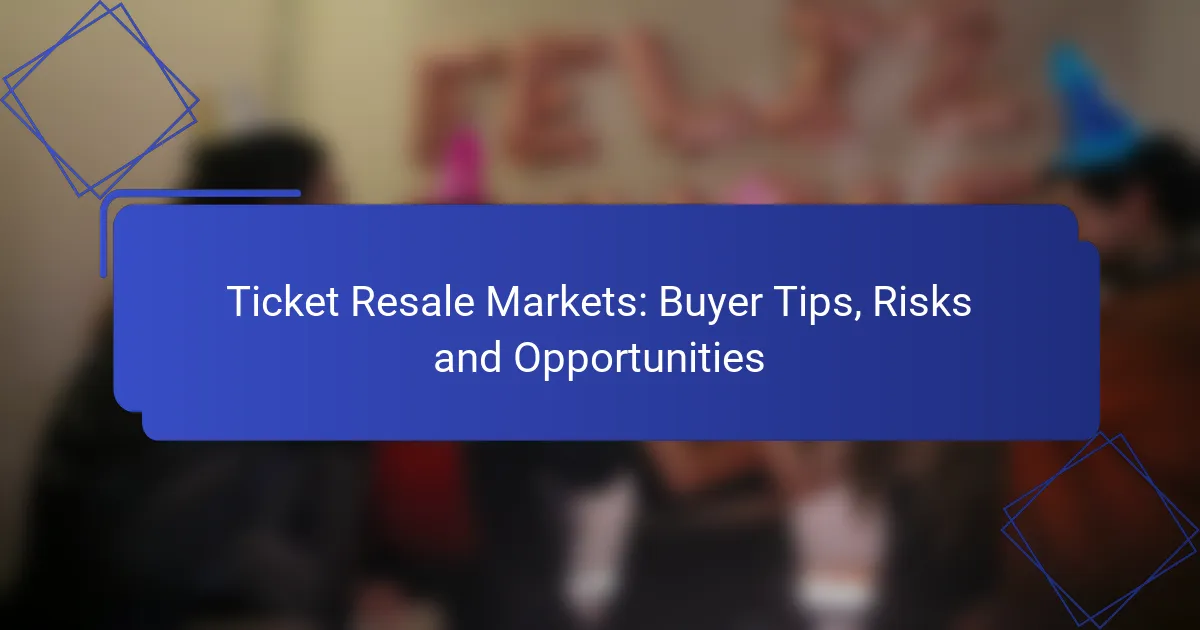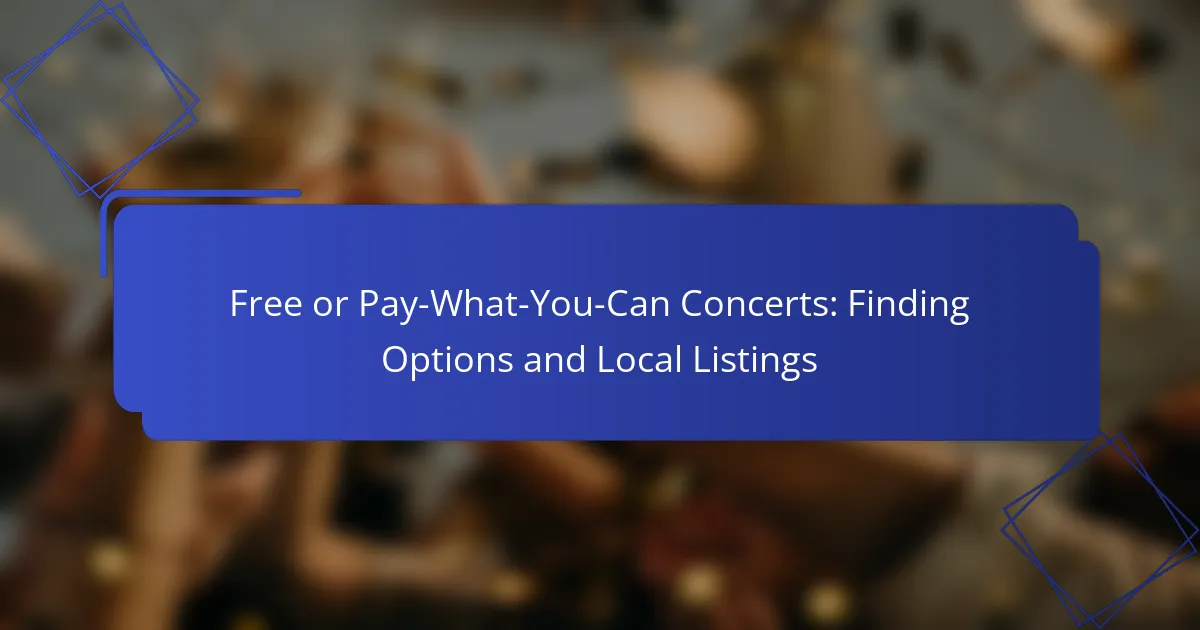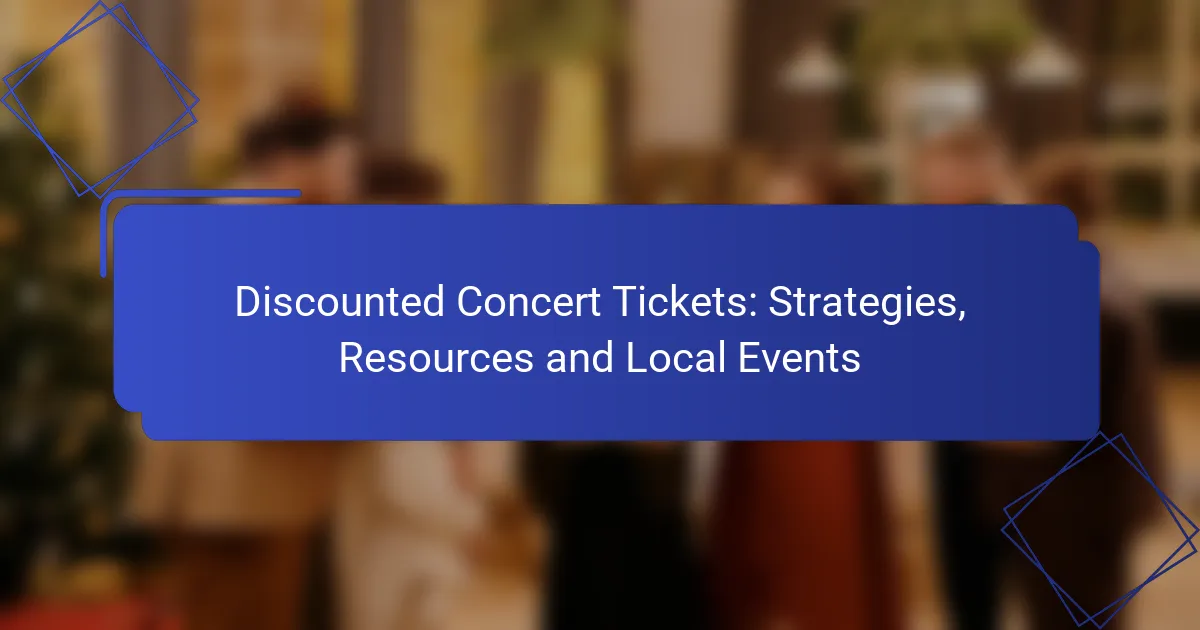Navigating ticket resale markets can be both exciting and daunting for buyers. While these platforms provide access to sold-out events and potential discounts, they also come with risks such as counterfeit tickets and inflated prices. To ensure a safe purchase, it’s essential to use trusted platforms, verify seller credibility, and understand ticket authenticity guarantees.

How to buy tickets safely in resale markets?
To buy tickets safely in resale markets, focus on using trusted platforms, verifying seller credibility, and ensuring secure payment methods. Understanding ticket authenticity guarantees is also crucial to avoid scams and counterfeit tickets.
Use reputable platforms like StubHub
Choosing reputable platforms such as StubHub, Viagogo, or Ticketmaster’s resale section can significantly reduce risks. These sites often have built-in protections and customer service support to assist with any issues that arise.
Look for platforms that have a strong reputation and positive user feedback. Avoid lesser-known sites that may not have the same level of security or customer support.
Verify seller ratings and reviews
Before purchasing, check the seller’s ratings and reviews. A high rating and positive feedback from previous buyers indicate reliability and trustworthiness.
Be cautious of sellers with few reviews or a low rating. If possible, opt for sellers with a history of successful transactions to minimize the risk of fraud.
Check for secure payment options
Always use secure payment options when buying tickets. Look for platforms that offer payment methods like credit cards or PayPal, which provide buyer protection in case of disputes.
Avoid direct bank transfers or cash payments, as these methods typically do not offer any recourse if the transaction goes wrong.
Understand ticket authenticity guarantees
Many reputable resale platforms offer authenticity guarantees, ensuring that the tickets you purchase are legitimate. Familiarize yourself with these guarantees and the terms associated with them.
In case of issues, know the steps to take to claim a refund or replacement. This knowledge can save you time and money if you encounter counterfeit tickets.

What are the risks of buying resale tickets?
Buying resale tickets carries several risks that can impact your experience and finances. Key concerns include the potential for counterfeit tickets, inflated prices, and the possibility of last-minute cancellations or changes.
Potential for counterfeit tickets
One of the biggest risks in the resale ticket market is the chance of purchasing counterfeit tickets. Fraudulent sellers may create fake tickets that appear legitimate but will not grant you access to the event.
To mitigate this risk, always buy from reputable platforms that offer buyer protection and guarantees. Look for features like barcode verification or official seller partnerships to ensure authenticity.
Price inflation compared to face value
Resale tickets often come at a premium, significantly higher than their original face value. This price inflation can range from a modest increase to several times the original cost, depending on demand and availability.
Before purchasing, compare resale prices across multiple platforms to find the best deal. Be cautious of prices that seem too good to be true, as they may indicate a scam or hidden fees.
Last-minute cancellations or changes
Another risk is the potential for last-minute cancellations or changes to the event. Resale tickets may not always guarantee entry if the event organizer decides to cancel or alter the event details.
Check the cancellation policies of both the event and the resale platform before buying. Consider purchasing tickets that offer flexible refund options to protect your investment in case of unforeseen changes.
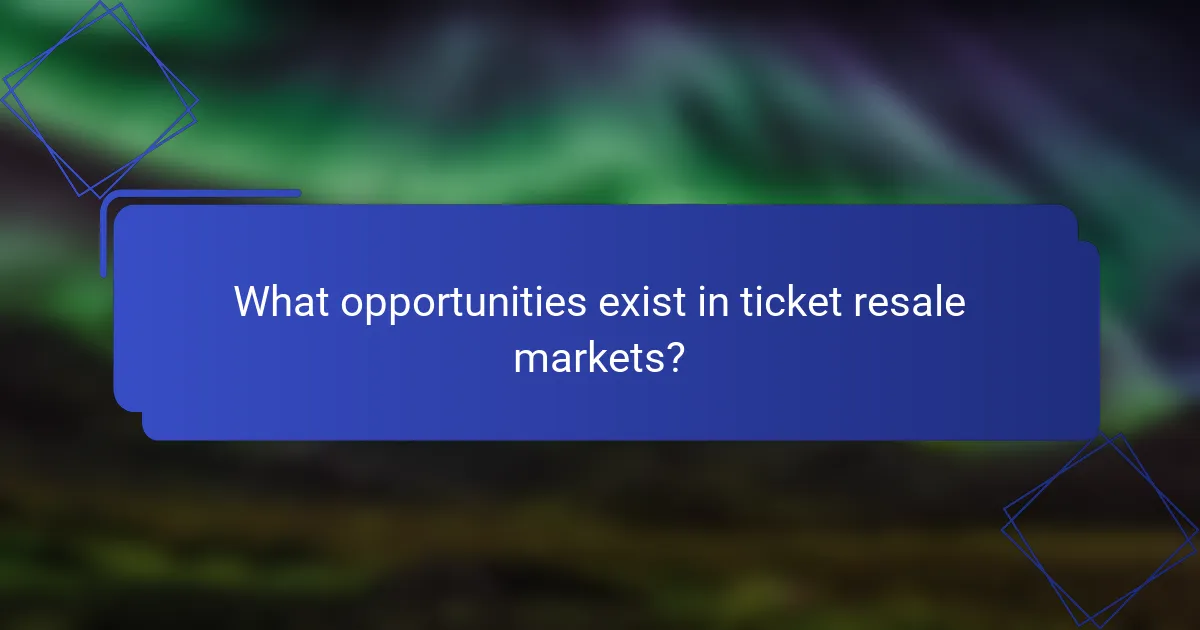
What opportunities exist in ticket resale markets?
Ticket resale markets offer various opportunities for buyers, including access to sold-out events, potential discounts, and investment prospects for rare tickets. Understanding these opportunities can help buyers make informed decisions and maximize their experiences.
Access to sold-out events
One of the primary advantages of ticket resale markets is the ability to access sold-out events. When popular concerts, sports games, or theater performances sell out quickly, resale platforms often have tickets available from individuals who can no longer attend.
To secure these tickets, buyers should act fast and monitor multiple resale sites. Prices can vary significantly, so comparing listings is essential to find the best deal. Be prepared to pay a premium, especially for high-demand events.
Possibility of finding discounted tickets
Another opportunity in ticket resale markets is the chance to find discounted tickets. As the event date approaches, sellers may lower prices to offload their tickets, especially if demand is waning.
Buyers should keep an eye on ticket prices over time and set alerts on resale platforms. This strategy can lead to significant savings, especially for events that are not sold out. However, be cautious of last-minute purchases, as availability can be limited.
Investment potential for rare tickets
Rare tickets can serve as an investment opportunity within the resale market. Tickets for exclusive events, such as VIP experiences or limited-edition shows, can appreciate significantly in value over time.
When considering ticket investments, research the event’s historical resale values and market trends. Keep in mind that the resale market can be unpredictable, so investing in tickets should be approached with caution. Diversifying your ticket portfolio can help mitigate risks associated with fluctuations in demand.
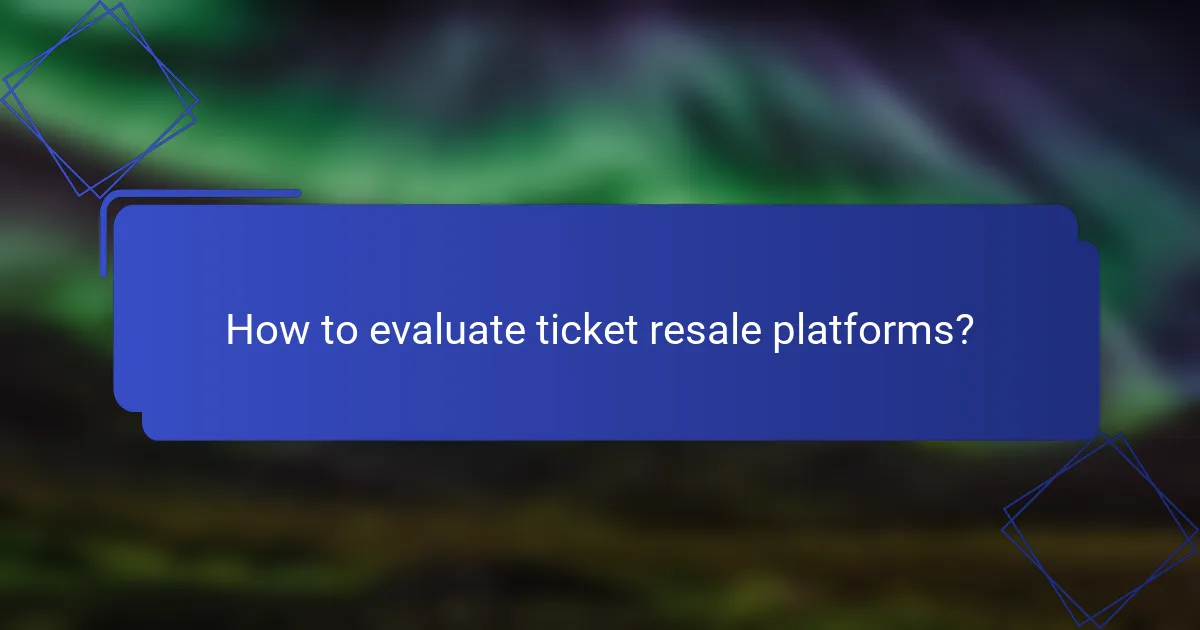
How to evaluate ticket resale platforms?
To evaluate ticket resale platforms effectively, consider factors such as fees, user experience, and the platform’s reputation. A thorough assessment will help you choose a reliable site that meets your needs while minimizing costs.
Compare fees and commissions
Fees and commissions can significantly impact the total cost of purchasing tickets on resale platforms. Typically, platforms charge a percentage of the ticket price, which can range from around 5% to 20%, depending on the site and the event.
When comparing platforms, look for any additional charges, such as service fees or delivery costs. Some sites may offer lower commissions but higher service fees, so calculate the total cost to find the best deal.
Always read the fine print regarding fees before making a purchase to avoid unexpected costs. Consider platforms that provide transparent pricing structures to ensure you know exactly what you’re paying for.
Assess user experience and interface
User experience and interface are crucial for a smooth ticket buying process. A well-designed platform should be easy to navigate, allowing you to search for events, filter options, and complete purchases quickly.
Check for features like mobile compatibility, customer support availability, and user reviews. A platform with a responsive design and helpful customer service can enhance your overall experience and provide assistance if issues arise.
Additionally, consider the security measures in place to protect your personal and payment information. Look for platforms that use encryption and have a good reputation for safeguarding user data.
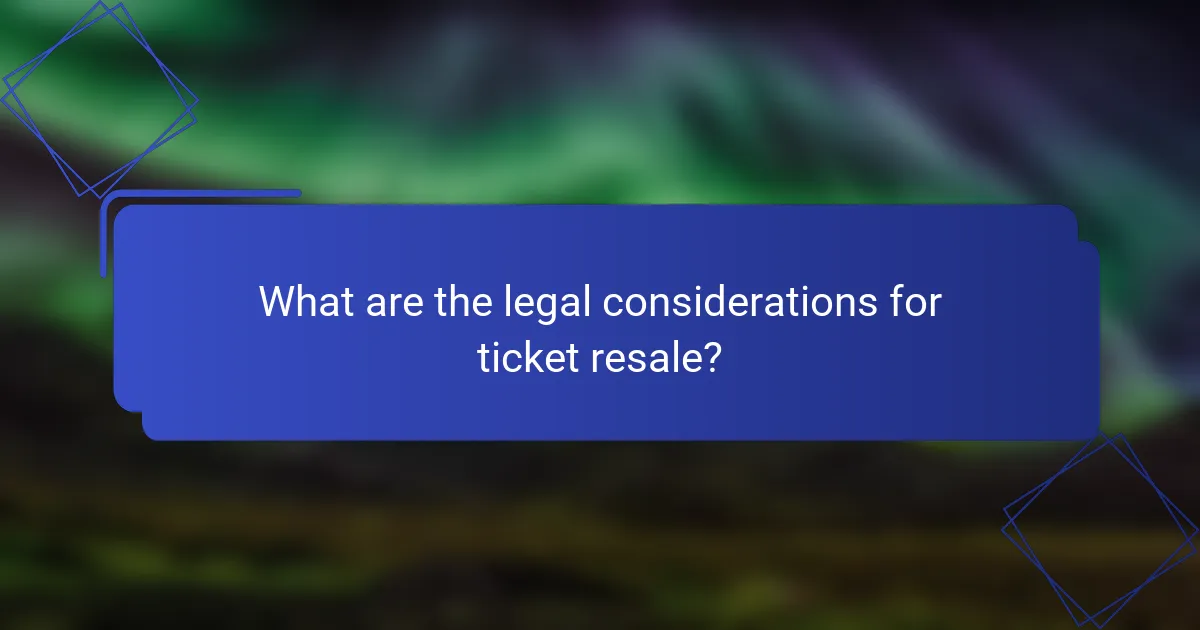
What are the legal considerations for ticket resale?
Legal considerations for ticket resale vary significantly by location and can impact both buyers and sellers. Understanding these laws is crucial to avoid penalties and ensure a smooth transaction.
Understand local laws on ticket scalping
Ticket scalping laws differ from one region to another, with some areas imposing strict regulations while others have minimal restrictions. For instance, in some U.S. states, scalping is illegal, while others allow it with certain conditions, such as obtaining a license. Always check your local laws to understand what is permissible.
In Europe, regulations can also vary; countries like France have specific laws against excessive markups. Familiarizing yourself with these laws helps you avoid legal issues when buying or selling tickets.
Know the regulations for online sales
Online ticket resale platforms often have their own set of rules that comply with local laws. Ensure that the platform you choose adheres to legal standards and provides buyer protection. For example, some sites may require sellers to disclose the original ticket price and any additional fees.
Additionally, be aware of consumer protection laws that apply to online transactions. In many jurisdictions, buyers have the right to a refund if the event is canceled or if the tickets are not as described. Always read the terms and conditions of the platform before proceeding with a purchase.
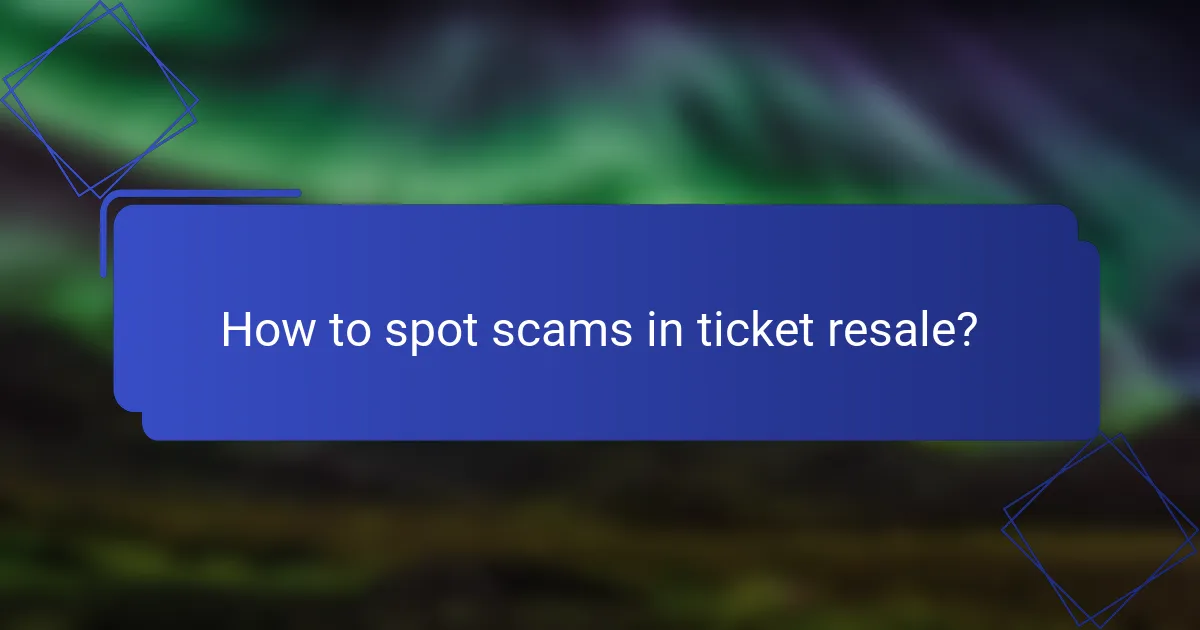
How to spot scams in ticket resale?
To effectively spot scams in ticket resale, look for inconsistencies in listings, seller behavior, and payment methods. Being aware of common warning signs can help you avoid losing money on fraudulent tickets.
Recognize red flags in listings
When browsing ticket resale listings, be vigilant for red flags such as prices that are significantly lower than the market average. If a ticket is being sold for a fraction of its face value, it may indicate a scam. Additionally, listings with poor-quality images or vague descriptions can be suspicious.
Check for urgency tactics, like claims that tickets are selling out quickly. Scammers often create a false sense of urgency to pressure buyers into making hasty decisions. Always take the time to research and compare prices across multiple platforms.
Verify seller identity and contact information
Before purchasing tickets, verify the seller’s identity by checking their profile ratings and reviews on the resale platform. A seller with a high number of positive reviews is generally more trustworthy. If the seller has little to no history, proceed with caution.
Ensure that the seller provides clear contact information. Legitimate sellers should be willing to communicate through the platform’s messaging system or provide a verified email address. Avoid sellers who only offer vague or untraceable contact methods, as this can be a sign of a scam.
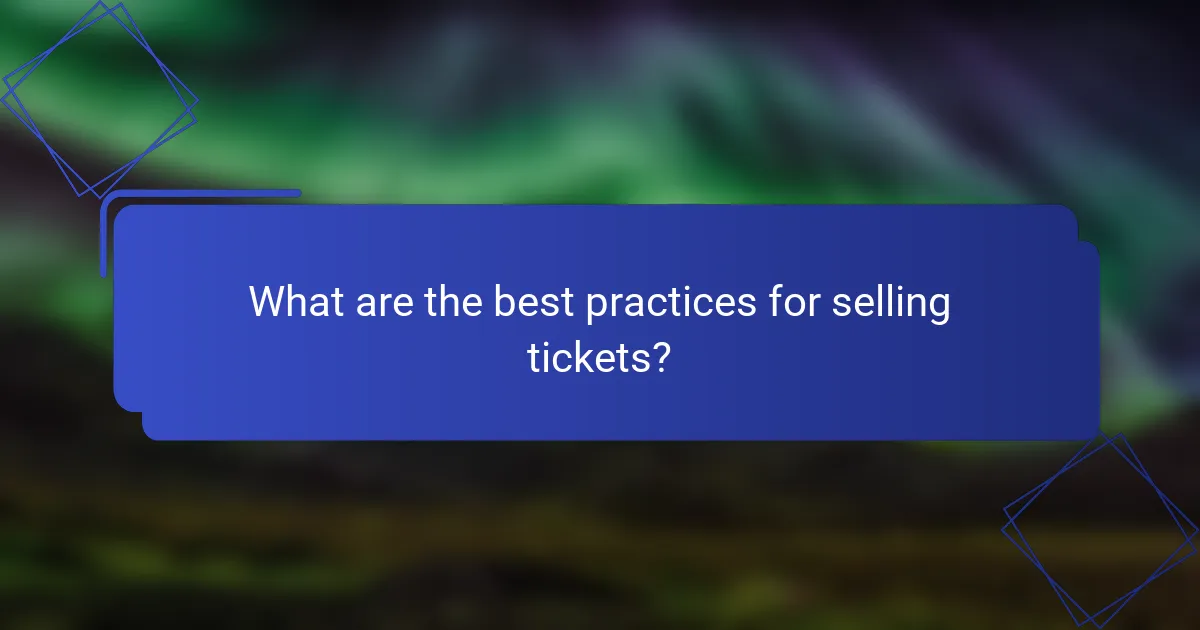
What are the best practices for selling tickets?
To successfully sell tickets, it’s crucial to understand market dynamics, set appropriate prices, and utilize reliable platforms. Following best practices can maximize your profits while minimizing risks associated with ticket resale.
Set competitive prices based on market trends
Setting competitive prices is essential for attracting buyers in the ticket resale market. Research current market trends by checking similar events and ticket listings on various platforms to gauge the going rates.
Consider factors such as demand, event popularity, and seating location when determining your ticket prices. For example, tickets for highly sought-after concerts or sports events may sell for significantly more than face value, while less popular events might require lower pricing to entice buyers.
Utilize tools and websites that track ticket prices over time to identify patterns. Aim to price your tickets within a reasonable range—typically within 10-20% of the average market price—to remain competitive while still achieving a profit. Avoid overpricing, as this can lead to unsold tickets and lost opportunities.
